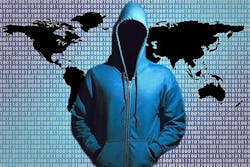Threat to Internet may be at new level if computer hackers have dangerous cyber warfare tools
We're in a period of ubiquitous Internet use that extends far beyond the casual Web browser who checks the news, e-mail, and a few social media sites. Today we control our home lighting and utilities, carry out bank transactions, and undergo consultations and routine medical procedures with our doctors all over the Internet from our smart phones.
It's not just individuals doing this, either. Utilities control parts of the nation's power grid, banks move money and alter interest rates, and the military orders food and ammunition for the troops, all via transactions conducted over the Internet.
Is there anything we DON'T do over the Internet these days? We should enjoy it while we can.
In the future, I fear, we'll look back at these days as a past golden age of open information, convenience, and control over the Internet. The dark specter of cyber warfare and computer hackers threatens to transform today's digital paradise into scorched-Earth cyber desolation.
Related: DARPA eyes cyber security for Internet of Things (IoT) and embedded computing devices
We've all heard about hacker and cyber-attacks on fast-food restaurants, retail stores, and government agencies that could result in the theft of people's identities. Still, all we know about the cyber threat today may be only the beginning; things may about to get a lot worse.
I'm reading today that a computer hacker group called the Shadow Brokers may have stolen cyber warfare tools made by the creators of the sophisticated computer malware programs called Stuxnet, Duqu, and Flame. Stuxnet still is considered one of the most advanced computer worms ever created, and helped to disrupt Iran's nuclear program.
These cyber tools and malware may have been stolen from a group with connections to the U.S. National Security Agency (NSA) -- one of the most secretive and potent government agencies responsible for cyber security, encryption, and cyber warfare.
Is the NSA itself under cyber threat? Has that agency been compromised? If the NSA has fallen to cyber warfare hackers, then who's safe?
Okay, I know I'm probably being melodramatic. Those accounts may not be true at all; it all may be one big hoax. It's something to think about, though.
Related: U.S. military's reliance on Internet could leave warfighters vulnerability to cyber attack
Let's consider what could happen if terrorists, others hostile to the U.S. and the Western World, or even nations hostile to the U.S. and the West got their hands on cyber warfare tools like Stuxnet, Duqu, and Flame.
Would electric utilities be safe? Could we trust our food and water supplies? Would our bank and retirement accounts still be there tomorrow? Could we count on accurate weather forecasting as the hurricane season drags on?
What about the U.S. military? Would our strategic reconnaissance satellites still work? Could we trust our intelligence data? Would our weapons-targeting systems still be reliable?
Now let's bring it back to the individual. Today we count on the Internet to bring us much of the information we need to conduct our lives every day. What if that were to go away?
Related: Internet of Things (IoT) market to reach $103.6 billion worldwide by 2018, analysts predict
I've read novels speculating that coordinated and sustained cyber-attacks resulting from a future war could dissolve the Internet into segregated and unconnected information ghettos -- some more reliable than others, some more dangerous than others, and none of them with information accurate enough to stake your life on.
In this cyber reality digital worms and viruses lurk around every corner. Disinformation is rampant to confuse, distract, and sew fear. The institutions we trust -- from government to the supermarket -- either turn on us or disappear altogether.
I remember as kid during the Cold War the "duck-and-cover" drop drills we had in school. Some kids were afraid that Russian bombers could appear overhead any minute. That was a time when nuclear bombs were the biggest threat, caused all kinds of anxiety, and even encouraged some to dig fallout shelters in their backyards.
Maybe today the biggest threats aren't nuclear bombs, but cyber bombs. Could a big cyber-attack bring the world we know to an abrupt halt?
Maybe. Maybe not. I do know that I'll sleep less soundly tonight knowing that some of the world's most vicious cyber weapons may be headed into the hands of terrorists or other U.S. adversaries.
Let's hope it isn't true.
Learn more: search the Aerospace & Defense Buyer's Guide for companies, new products, press releases, and videos

